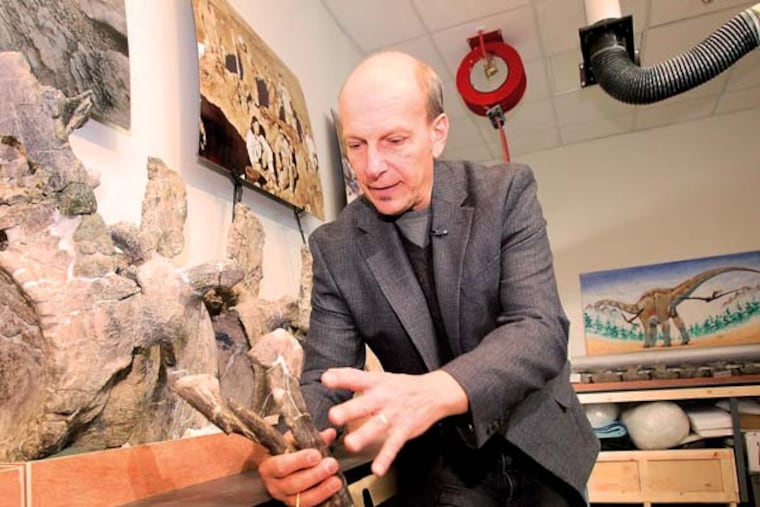Paleontologist gets equal pleasure explaining his work
Kenneth Lacovara has spent the last decade on a paleontologist's dream project: unearthing and analyzing the skeleton of a 65-ton dinosaur from Argentina.

Kenneth Lacovara has spent the last decade on a paleontologist's dream project: unearthing and analyzing the skeleton of a 65-ton dinosaur from Argentina.
On Tuesday, the Drexel University scientist is speaking about his work at a breakfast meeting of South Jersey business leaders.
For Lacovara, 53, that might be almost as rewarding.
A successful career in science these days requires a steady focus on drumming up support - maybe courting politicians, attending receptions with benefactors, explaining research to laypeople. Lacovara, who speaks in clear, camera-ready sound bites with a winning smile, seems to enjoy it.
Says colleague Jason Poole, coordinator of dinosaur hall at the Academy of Natural Sciences:
"If I had to make a guess what's more important to him, doing the science or getting people excited in the science, I think at this point in his life, he might pick getting people excited in the science."
There has been a lot of excitement this week. Lacovara's team made international headlines with the unveiling of Dreadnoughtus schrani, a massive, long-necked beast with legs like tree trunks. With an unusually complete skeleton, it is the heaviest known dinosaur for which a weight can be accurately estimated.
Lacovara's initial passion for the sciences was ignited by something much smaller.
The carpenter's son grew up in Linwood, Atlantic County, where the coastal terrain is largely sand and mud. Then one day at a Cub Scouts meeting, when Lacovara was in second grade, an amateur geologist brought in a box of geodes and minerals.
"I didn't know these things were in the world," Lacovara recalled. "It just kind of blew my mind."
He proceeded to write an essay for school about various kinds of rocks and which were most likely to harbor fossils. He also wrote that geologists get to camp out all the time.
In his case, that would turn out to be true. As with many paleontologists, Lacovara's roots are in the field of geology; he estimates he has spent two years of his life in tents.
He studied geography as an undergraduate at what is now Rowan University. Then came a master's in coastal geomorphology from the University of Maryland, followed by a Ph.D. in geology from Delaware, where his dissertation included work on invertebrate beach fossils.
His first dinosaur expedition was in 2000, a trip to Egypt with University of Pennsylvania colleagues. Others followed in China and Argentina.
Lacovara was initially in Drexel's biology department, as the school's lone paleontologist. Several more joined him when the Academy of Natural Sciences merged with the university in 2011. Scientists from Drexel and the Academy now make up a new Department of Biodiversity, Earth, and Environmental Science, which Lacovara helped create.
Always, he takes time to share his work, giving politicians tours of his Drexel lab and patiently explaining concepts to the media and supporters. The work in Argentina was partly funded by Adam Schran, a Philadelphia tech entrepreneur.
At the Tuesday breakfast for business leaders, Lacovara's main goal is seeking support for a rich fossil site close to home - an old mining pit in Mantua Township, Gloucester County, where he and others have dug up all manner of prehistoric crocodiles, sharks, and turtles.
He has helped township officials in applying for a state grant to purchase the property from its industrial owner. His goal is to turn it into a permanent public fossil park. Already, he gives periodic tours to children and adults alike.
Peter Dodson, a prominent Penn paleontologist, who invited Lacovara on that first Egypt trip, is an admirer.
"He's very good at figuring out how to garner support," Dodson said. "He's good-looking, he's energetic. He's very well spoken."
For Lacovara, the tours and the sound bites are about much more than garnering support.
His prime goal is to hook kids on science, which he says is more important than writing a paper in some obscure journal that only colleagues will read.
One child who is already hooked is 6-year-old Rudyard, Lacovara's son with his wife, Jean. When visitors come to the family's home in Woolwich Township, the boy has been known to expound on shale formations from the Cambrian period.
When Lacovara watches other children dig up 65-million-year-old clams at the mine-pit site in South Jersey, he knows most of them will not grow up to be paleontologists. But he figures they are a good bet for chemistry, physics, or engineering.
"I always call paleontology the gateway drug to the sciences," he said. "When you're inculcating them with the scientific method, I truly believe that once someone has that stuff in their brain, it's impossible to get rid of it."
>Inquirer.com
Stories and multimedia about the discovery, plus fossil-based animation showing how other prehistoric reptiles moved: www.inquirer.com/findEndText
215-854-2430